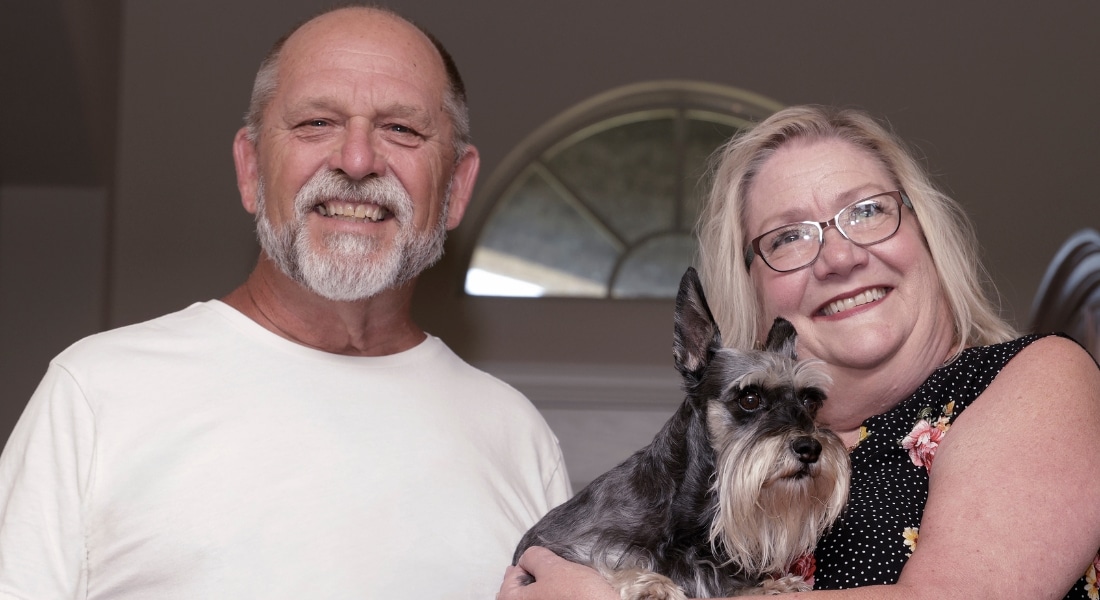From traveling for work to keeping up with nine grandchildren, Mike Amman had plenty of valid excuses to put off his routine colonoscopy before a large polyp was found in his colon.
“Once the doctor saw the size of it, he said, ‘The only way this is coming out is surgery,’” Mike says of the benign tumor that had grown to the size of a tennis ball before his July 2023 surgery at Methodist Charlton Medical Center.
About 1 in 3 men and 1 in 4 women develop polyps in their colons, which doctors can usually remove during a colonoscopy. These clumps of pre-cancerous cells start out small and typically don’t cause symptoms until they get larger — when they can become cancerous and spread.
Now, almost a year after his robotic-assisted surgery, he’s put that ordeal behind him and couldn’t be happier with his care at Methodist Charlton.
“The nursing staff, doctors, and hospital were extremely awesome,” Mike says. “I commend them.”
 Mike, with wife Aundria, is back to enjoying the bounty from their backyard garden in Waxahachie.
Mike, with wife Aundria, is back to enjoying the bounty from their backyard garden in Waxahachie.
‘BLEW OFF’ SCREENING
Before the surgery, Mike had let his routine colonoscopy slide for two years beyond his usual three-year interval because he travels a lot for work. While he’s prone to polyps, Mike saw no signs that anything was amiss. That’s not unusual before a polyp becomes cancerous.
“I blew it off for a couple of years when I probably shouldn’t have,” Mike says.
Doctors recommend colonoscopies every five to 10 years starting at age 45, but patients who are predisposed to polyps need a different schedule, and for good reason.
“Early identification of a colon polyp gives us the opportunity to prevent or cure colon cancer with less invasive techniques,” says Paul Hackett, MD, colorectal surgeon on the medical staff at Methodist Charlton. “That’s why it’s important to get colon cancer screenings on the timetable your primary care provider recommends.”
Trust your gut to advanced GI care at Methodist by finding a digestive health specialist near you. Visit MethodistHealthSystem.org
After a biopsy in which a pathologist evaluated samples under a microscope, the polyp was found to be benign. Even so, surgery was necessary, and part of Mike’s right colon would need to be removed, too.
“We take these measures because colon cancers often come from these polyps,” Dr. Hackett says. “We would not know if cancer was hiding in the polyp until it was completely removed and examined under the microscope.”
MINIMALLY INVASIVE
Using the da Vinci Surgical System, Dr. Hackett removed the ascending side of the colon and part of the terminal ileum, the last section of the small intestine where it connects to the large intestine, and then reconnected the two sides.
To perform this minimally invasive surgery, a surgeon makes small incisions and then uses robotic instruments that are carefully positioned in the patient’s abdomen. The surgeon is in control of the device at all times.

Back to work just a couple of weeks after his surgery, Mike says he never felt much pain at all.
‘OFF TO THE RACES’
Mike expected to be out of commission for a while, but the next day he was walking the halls of Methodist Charlton Medical Center.
“They told me to get up and move, so off to the races I went,” he recalls after his surgery in July 2023. “I felt fine.”
Four days after the surgery, Mike was able to go home. There, he stuck to a diet of soft foods as his body adjusted to the shorter digestive tract. Dr. Hackett advised Mike to limit his activity for six weeks, but this patient was determined to beat the standard timeline for recovery.
“I was going stir crazy,” Mike recalls. “After two weeks, I said, ‘I’m going back to work,’ and he said, ‘Okay, with limitations.’ I was on light duty for a good month after the surgery.”
Months later, Mike is back to enjoying life with his wife, Aundria, and family, including two adult children and all those grandkids. He’s looking forward to retirement and doing more fishing on Lake Tawakoni.
“My biggest mistake in life was selling my boat,” he says, not counting a postponed colonoscopy.






